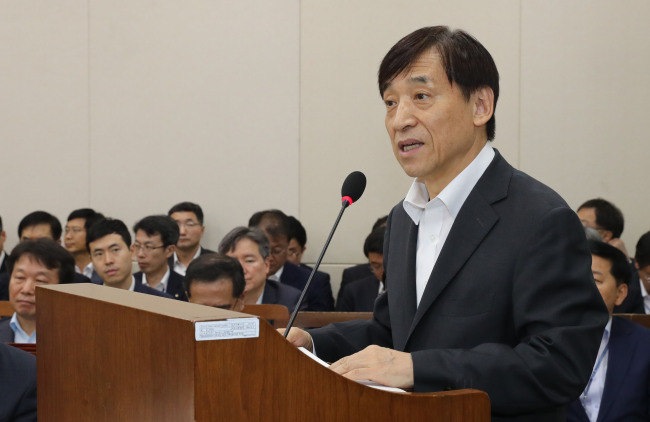In addition to the series of slack economic indices, the latest statistics on bank loans has added further weight to burgeoning speculations that South Korea’s central bank is likely to shelve its policy rate hike action this month, holding off the inevitable decision to later in the year.
The loan balance for private businesses as of the end of July stood at 304.6 trillion won ($272.6 billion), up 2.5 trillion won from a month earlier, marking the steepest on-month jump in four months, according to data released Thursday by the Bank of Korea.
The accelerated increase in business loans came in contrast with the household loans which appeared to gradually ease up due to the government’s tighter lending rules, data showed.
Household loans totaled at 796.6 trillion won in July, up 4.8 trillion won from the previous month. The on-month increase rate was the lowest in the past five months and also down 1.9 trillion won from the same period last year.
Of the amount, housing mortgage loans -- which have long claimed a key part in the nation’s chronic household debt problem -- showed an on-month rise of 3.1 trillion won, pacing down slightly from a month earlier.
“Since the government introduced a new debt-to-income and debt service ratio (to restrict excessive real estate loans), the household loan trend has been gradually slowing down,” said an official of BOK.
The recent fall in real estate transactions also contributed to the slower pace of mortgage loans, the official added.
The trade volume for Seoul apartments has been on a downturn since April, when the government reinforced the transfer tax system for multiple home owners. The monthly figure for July stood at 5,635 units, down 40 percent from March, according to data compiled by the Ministry of Land, Infrastructure and Transport.
 |
Bank of Korea Gov. Lee Ju-yeol speaks in a parliamentary committee session in late July. (Yonhap) |
Despite some alleviation in the household debt sector, however, the central bank is still weighed down by mounting pessimism on the country’s economic forecast and sluggish economic indexes.
The Korea Development Institute, a think tank affiliated with the Ministry of Economy and Finance, on Wednesday speculated in its monthly report that the economic growth for this year will stop at 2.8 percent. The BOK and the government earlier revised the initial forecast of 3 percent to 2.9 percent, reflecting the challenges in domestic consumption and employment.
While the country’s exports continued the upbeat pace, the consumer price index in July climbed 1.5 percent from the previous month. This on-month growth fell visibly below the BOK’s yearly target of 2 percent -- a figure regarded as a key precondition for money-tightening rate hike actions.
A key factor adding pressure upon Seoul’s monetary policymakers is the fact that the United States is highly anticipated to increase its key rate in the imminent future, as early as next month.
According to a report issued by the BOK’s New York office Wednesday, there is a 91 percent chance that the Fed may inch up its policy rate in September.
The change, should it take place, is to further widen the US-Korea interest rate reverse and is expected to lead to an outflow of capital from the domestic market here.
By Bae Hyun-jung (
tellme@heraldcorp.com)








![[Today’s K-pop] Blackpink’s Jennie, Lisa invited to Coachella as solo acts](http://res.heraldm.com/phpwas/restmb_idxmake.php?idx=644&simg=/content/image/2024/11/21/20241121050099_0.jpg)